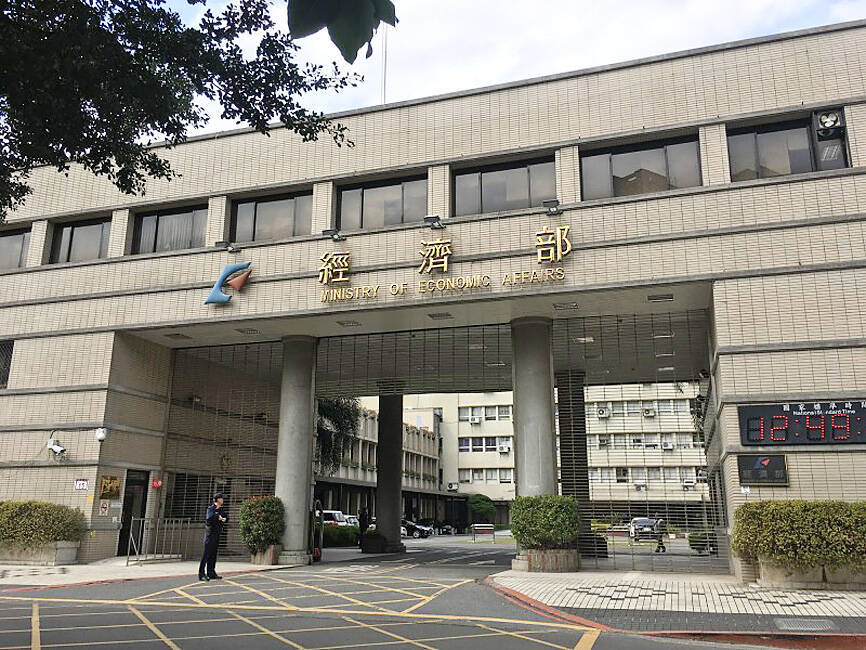With contract chipmaker Taiwan Semiconductor Manufacturing Co (TSMC, 台積電) investing huge amounts on building advanced fabs in the US and Japan, approved outbound investment from Taiwanese firms hit a new high last year, the Department of Investment Review under the Ministry of Economic Affairs (MOEA) said yesterday.
The department approved about US$44.93 billion in outbound investment last year, soaring 90.57 percent from a year earlier, smashing the previous record of US$23.58 billion in 2023.
The surge largely came after TSMC secured approval to raise its investment in the US and Japan by US$12.5 billion and US$52.62 billion, respectively, the department said in a report.

Photo: Taipei Times
In addition, semiconductor distributor WT Microelectronics Co (文曄科技) also obtained approval to spend US$3.98 billion acquiring Canadian-based Future Electronics Inc; Hon Hai Precision Industry Co (鴻海精密) was approved to invest US$2.63 billion in Foxconn Singapore Pte Ltd; and Vanguard International Semiconductor Corp (世界先進) received the green light to invest US$2.4 billion in Visionpower Semiconductor Manufacturing Co Ptd Ltd, the report said.
Last year, the department approved US$8.72 billion in investments in countries under the government’s New Southbound Policy, up 57.42 percent from a year earlier, with Singapore, Vietnam and Malaysia the main destinations.
The New Southbound Policy, introduced in 2016, aims to enhance trade and exchanges between Taiwan and 18 countries in Southeast Asia and South Asia, as well as Australia and New Zealand, in a bid to reduce Taiwan’s dependence on China.
As for China-bound investment, the approved amount totaled US$3.65 billion last year, up 20.33 percent from a year earlier, due to an increase in acquisitions and mergers by Taiwanese investors, the department said.
Meanwhile, Taiwan approved US$7.86 billion in direct foreign investments (FDIs) last year, down 30.18 percent from a year earlier due to a relatively high comparison base in 2023, despite a large amount of investment from multinational firms such as semiconductor equipment supplier ASML Holding NV, software giant Microsoft Corp and e-commerce giant Amazon.com Inc.
Taiwan's FDI hit a record US$13.3 billion in 2022 and the third-highest NT$11.25 billion in 2023 over the past 17 years, which the department attributed to the approval of a number of large offshore wind power and green energy investments during the two years. The second-highest was in 2018 at US$11.44 billion, department data showed.
Approved inbound investment from China jumped 901.04 percent from a year earlier to US$297.22 million last year as China-owned Cloud Network Technology Singapore Pte Ltd (鴻運科) was given approval to raise investment in its branch in Taiwan by NT$9 billion (US$273 million), the report said.
Approved investments from New Southbound Policy decreased 80.8 percent annually to US$487.4 million, with Singapore, Malaysia and Australia the main sources of investment, it said.

On Tuesday, US President Donald Trump weighed in on a pressing national issue: The rebranding of a restaurant chain. Last week, Cracker Barrel, a Tennessee company whose nationwide locations lean heavily on a cozy, old-timey aesthetic — “rocking chairs on the porch, a warm fire in the hearth, peg games on the table” — announced it was updating its logo. Uncle Herschel, the man who once appeared next to the letters with a barrel, was gone. It sparked ire on the right, with Donald Trump Jr leading a charge against the rebranding: “WTF is wrong with Cracker Barrel?!” Later, Trump Sr weighed

SinoPac Financial Holdings Co (永豐金控) is weighing whether to add a life insurance business to its portfolio, but would tread cautiously after completing three acquisitions in quick succession, president Stanley Chu (朱士廷) said yesterday. “We are carefully considering whether life insurance should play a role in SinoPac’s business map,” Chu told reporters ahead of an earnings conference. “Our priority is to ensure the success of the deals we have already made, even though we are tracking some possible targets.” Local media have reported that Mercuries Life Insurance Co (三商美邦人壽), which is seeking buyers amid financial strains, has invited three financial

Artificial intelligence (AI) chip designer Cambricon Technologies Corp (寒武紀科技) plunged almost 9 percent after warning investors about a doubling in its share price over just a month, a record gain that helped fuel a US$1 trillion Chinese market rally. Cambricon triggered the selloff with a Thursday filing in which it dispelled talk about nonexistent products in the pipeline, reminded investors it labors under US sanctions, and stressed the difficulties of ascending the technology ladder. The Shanghai-listed company’s stock dived by the most since April in early yesterday trading, while the market stood largely unchanged. The litany of warnings underscores growing scrutiny of

OUTLOOK: Among the six sub-indices, only the stock market confidence sub-index rose due to strong equity performance and expectations of a US Federal Reserve rate cut Consumer confidence weakened further this month, sliding to its lowest level in two-and-a-half years as households grew increasingly uneasy about the economic outlook, job security and big-ticket spending, a survey by the National Central University showed yesterday. The consumer confidence index fell 1.07 points from last month to 63.31, the weakest number since May 2023, said the university’s Research Center for Taiwan Economic Development (RCTED), which conducts the monthly poll. “Although the Directorate-General of Budget, Accounting and Statistics recently increased Taiwan’s GDP growth forecast for this year to 4.45 percent, consumer sentiment tells a different story,” RCTED director Dachrahn Wu